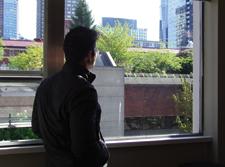Six months in jail, 60 to 80 lashes and death by stoning is the potential fate that awaits a gay man who fled to Canada from Iran, where he faces sodomy charges.
Yaser (who requested his last name not be published) now faces deportation, after the Immigration Refugee Board (IRB) in Vancouver denied his refugee claim because it didn’t believe he was gay.
A federal court subsequently refused to review his case.
Yaser, 29, is now pursuing the only two options he has left: seeking a pre-removal risk assessment (PRA) to determine whether he’ll be in danger if sent back to Iran, and applying to remain in Canada on humanitarian and compassionate grounds.
Speaking to Xtra through a translator, Yaser says his attraction to men was “always there” but he only became familiar with the idea of being able to live as a gay man after he got to Canada.
Life in Iran was “simple, traditional” and “very controlled,” he says.
His attraction to men became a life–threatening matter after police disrupted a house party he was having with two other friends, who were having sex. Yaser escaped arrest, but his two friends were taken into custody. He later learned that he and his friends were charged with sodomy.
Three months later, Yaser fled Iran. He ended up in Vancouver where he was detained for 19 days before being released to prepare for his refugee hearing last September.
In denying Yaser refugee status, the IRB ruled the Iranian court documents weren’t genuine because they bore a court clerk’s seal rather than a judge’s seal, says Chris Morrissey of the Rainbow Refugee Committee.
The board also questioned why it took Yaser so long to leave Iran if he knew “as a gay man” that he was in danger, Morrissey says.
Moreover, the immigration minister’s representative at the hearing found Yaser’s inability to recognize the rainbow flag and Pride parades as gay cultural markers incredible.
Morrissey says that’s a very presumptuous judgment.
“Oftentimes, there’s an assumption on the part of board members that someone from another country, being gay or lesbian or trans, is equal to being gay, lesbian, trans here in Vancouver,” she notes.
“So for a board member not believing that Yaser is gay because he hadn’t participated in the 2008 Pride parade, [that] he should have known about the Pride parade, because of all the rainbow flags — if you’re living in a country like Iran there’s no such thing as a Pride parade and certainly they’re not flying rainbow flags,” Morrissey points out.
While she can’t speak to the specifics of Yaser’s case, IRB spokesperson Paula Faber says members receive specific training about handling refugee claims based on sexual orientation.
She says members are warned against stereotyping and made aware that claimants find it difficult to speak about what they’ve been through. They’re also coached in interview techniques and establishing claimant credibility.
Rainbow Refugee volunteer Sharalyn Jordan recently attended such a training session. She says there is no single litmus test to prove someone’s sexual orientation.
All refugee cases are complex, she says, especially sexual orientation cases.
“In no other kind of claim are people required to speak out about such intimate and stigmatized parts of themselves — I think that sets them apart,” Jordan says.
“They’re working to prove an identity or orientation that they have had to keep hidden in order to survive. So that creates all kinds of documentation problems, and also a real limit to the quality of information we have about country conditions around transphobic or homophobic persecution,” she explains.
“The best approach is to ask open-ended questions about people’s lives and listen for consistency and credibility.”


 Why you can trust Xtra
Why you can trust Xtra


